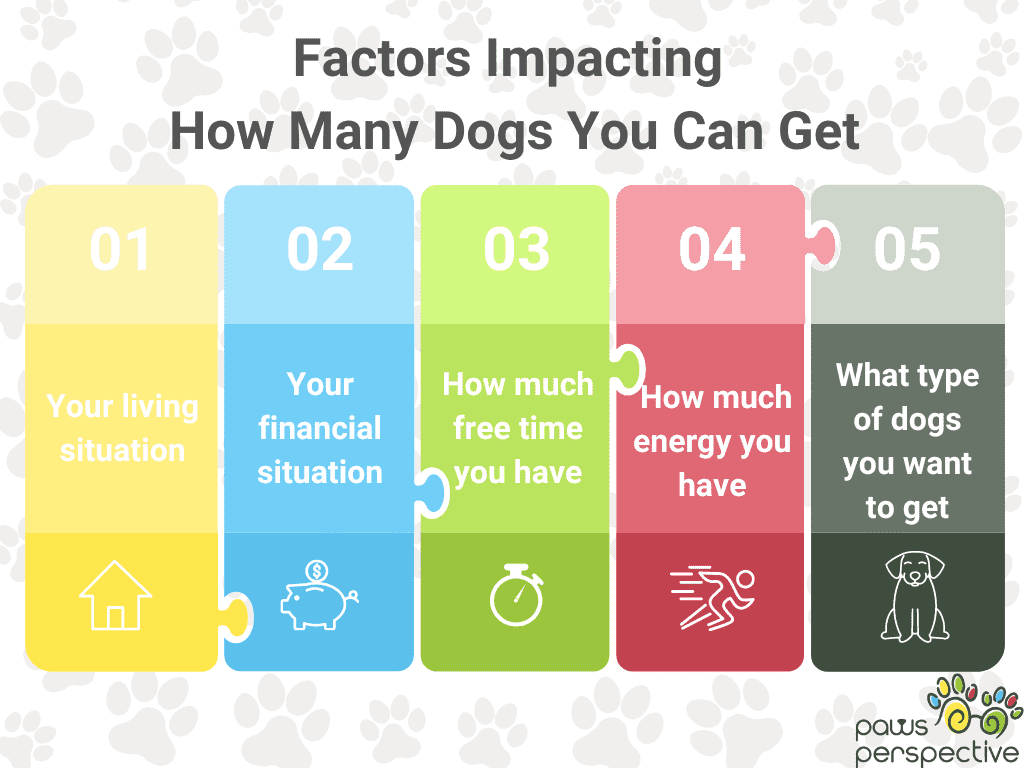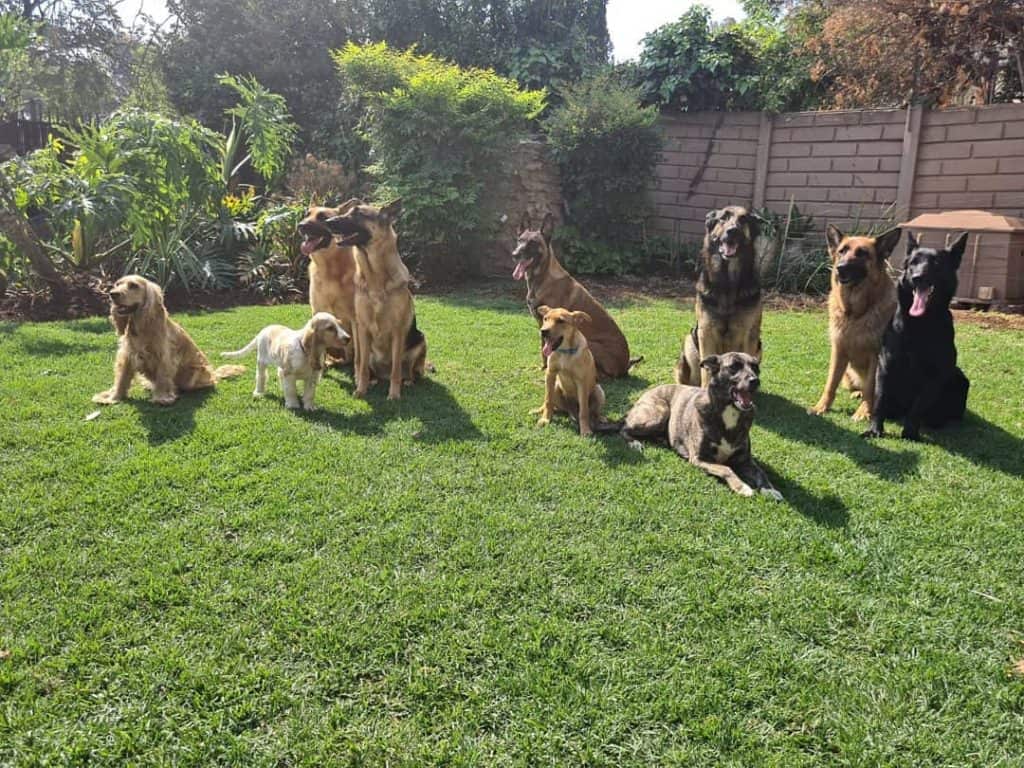I constantly nag my husband to get another dog, even when we already had three! And I know most dog owners become so in love with their dogs’ unconditional love that they wouldn’t mind an extra set of paws around the house. But how many dogs should you actually get? How many dogs will be the most beneficial for your household?
Usually, it’s best only to have two or three dogs at any time, but it depends on where you live. Most countries have specific regulations on the number of dogs people can get. It typically depends on the space available. For example, in the USA, some rural areas don’t have a limit as to how many dogs people can have. But, city dwellers might have a cap on two or three dogs. So, it depends on your area’s regulations.
It also depends on your preferences and a few other things, like your available finances or free time. So, think about how many dogs you’d ideally want to have and whether you can manage that many.
Things to Think About When Considering How Many Dogs to Get
There are many things to think about when deciding how many dogs to get, so it’s good to do some research. The deciding factors will be different for everyone, so the more information you gather, the better decision you can make for yourself and your future dogs.

1. Your Living Situation
Do you live in a large house with multiple floors or an apartment? How big is your yard? Is it enclosed? As you ask yourself these questions, think about how dogs will move around the house, whether it’s only one or five! Of course, meeting your dogs’ needs is essential, so only get as many as your living situation can accommodate.
2. Your Financial Situation
Can you afford all the expenses of dog ownership, such as food and vet bills, food, grooming, etc.? If not, can you afford at least one dog’s fees, and if so, which one will be most vital for you to have in your life at this time? Will any other expenses come with having multiple dogs (e.g., training or grooming)? Remember, dogs can become expensive, so make sure that you can handle the financial responsibilities as well.
On that note, it can become expensive to vaccinate your dogs, so you might wonder if you should do it at all. If you want to find out more, read this blog titled “Should Your Dog be Vaccinated? Get a Deep Understanding to Make a Better Decision”
3. How Much Free Time You Have
How much time do you have available each day/week/month/year to take care of one or more dogs (e.g., walking them)? If not much time (or any), will there be someone else who can help take care of them while they’re young puppies that need constant supervision? And if so, who would that person(s) be – family members, friends, etc.? Some dogs have more energy and need more daily exercise and attention than others. So, considering how much free time you have, consider how much each dog will need.
4. How Much Energy You Have
Are you energetic enough for multiple dogs’ needs right now in life – both physically (e.g., walking) and emotionally (e.g., caring about their well-being)? Or perhaps one may suffice until later when things change again, like retirement from work, etc.? And if so, what type of dogs should you get based on what we know about breeds’ temperaments, energy levels, and intelligence?
5. What Type of Dogs You Want to Get
What type of dogs do you want to get? Will you get a few of the same breed or different breeds? Will you get puppies or adult dogs? Dogs from breeders or rescue dogs? Each type of dog comes with their own set of needs you should consider. So you might need to do some research on the kind of dogs before considering the number of dogs.
My parents always had more than two dogs, which sounds a lot to most, but they had all the means to ensure all dogs are happy and healthy. So, your choice is totally dependent on your situation! The better idea you have of these considerations, the better you can meet all of the dogs’ needs.
How Many Dogs to Get: Considering Each Number
If you’re still not sure how many dogs you should get, consider each number on its own. How will it be if you only have one or two or three? There are benefits and challenges that come with each option. So, let’s have a look at each number alone to help make your choice easier.

One Dog
You’ll have less expense, less work, and less mess with one dog. But you also get less fun and companionship. Because dogs are pack animals by nature, they are usually happier when they have a companion or two to play with and share life with. It is also often easier to get a second dog than the first because, at this point, you know the basics of owning a dog, like how to walk them, feed them, housetrain them, etc.
However, keep in mind that some dogs don’t do well with other dogs, especially some rescue dogs. So, if you want to adopt a dog from a rescue shelter, ask the staff whether the dog will do well with other dogs or not. And if you’re keen on getting more than one dog, consider going for a dog that can socialize well with other dogs before adopting them.
Two Dogs
Two dogs are also a great idea if you have time and energy to devote to them. If you work full-time out of the home, two dogs may require taking them on more walks or hiring a dog walker for when you’re away. However, there’s no reason why two dogs can’t be able to entertain themselves when left alone together for the day. [It’s important to note that getting another dog to help a dog with separation anxiety won’t cure separation anxiety. It might help keep the dog busy but won’t fix the core problem of the dog’s anxiety].
Another thing to remember is that two dogs cause twice the messes and twice the vet bills! So, our final thought is that it’s all about personal preference, but we tend to think that if you want, one dog is awesome; two dogs are even better.
Three Dogs
Three dogs are the right number for you if you are a first-time dog owner or quarantiner who has some time to devote to taking care of multiple pets. It is especially a good number if all three dogs are relatively easy to care for when it comes to their exercise and training schedules.
On the other hand, three dogs can be challenging because they represent more potty walks, hair on the floor, grooming needs, etc. The level of challenge also depends on what type of dogs you get. For example, if you have three whippets, they can be a handful together. However, no matter how much effort they may be, you’re good to go if you can and want to manage it.
Four Dogs
When you consider how many dogs you want to get, you know that you have to consider your space, schedule, and budget in order to determine how many dogs you can realistically handle. If you think about getting four dogs, you probably have the space, energy, and finances to care for them.
If you get four large breed dogs, it can become a bit more chaotic during playtime than getting four small breed dogs. The same goes for getting four dogs with high energy levels. So, if you’re not keen on the effort, you can also think about getting a mixture of dog types. For example, getting a Labrador retriever and three small breeds, medium energy dogs, like French Bulldogs.
So, if you really want four dogs, you can mix and match so that their energies and effort levels complement each other to make your job even easier.
Five or More Dogs
Congratulations on your decision to adopt multiple pooches! Being able to care for so many dogs means you give them all a life they wouldn’t have had otherwise. Now that you’ve made that big step, it’s time to do a little planning. The number of dogs you have in your life means the more love and joy you have to give—but it also means more responsibility.
The trick is having enough time and money for all of your pups. In general, the more dogs you have, the larger a space they will take up when sleeping or playing. It would help if you had a place for them all to sleep comfortably and put down lots of toys for them to play with. Depending on how many dogs you adopt, this might be an issue if you don’t have much space in your home.
And then there’s the matter of their food and vet bills! If any of these issues are causing anxiety, my advice is not to rule out adopting so many dogs at once. You could just wait until things like more space or money become available before taking those extra steps. Remember, each dog that enters your family has needs of their own, and it’s your responsibility to meet all of those needs.
There is No Limit to How Many Dogs You Can Have
Okay, I know I’ve said this a lot, but it really does depend on your situation. How many dogs you should have depends on your situation. I know about people that have seven dogs and some that can only cope with two. There’s no actual limit other than the potential regulations where you live and what you can provide.
The Paws Perspective
I just love it when people want to get more dogs, as long as you are honest with whether you can manage it or not. The best question to ask is what makes a good dog owner. I believe it is someone who has the ability and resources to take care of all their dogs. Most importantly, it is someone that is physically, financially, and emotionally equipped to handle the number of dogs they want to get.
What’s so beautiful about the dog-loving community is that there are so many different dogs and owners out there. Some dogs can’t cope well with other dogs, making them perfect for people who only want one dog. On the other hand, some dogs cope well in large packs, making them ideal for those who wish to have many dogs.
Remember, you know your dogs the best and is the only one to advocate for them. So, as long as you do that, you’ll be the perfect dog owner to as many dogs as you wish to get.
